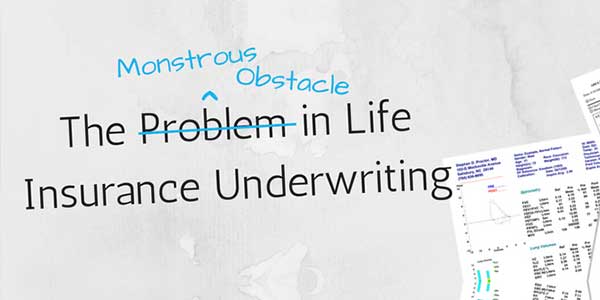
A life insurance policy pays a fixed amount of money to your beneficiaries if pass away. Most people get life insurance coverage to cover their liabilities (e.g. a mortgage balance) or pay for their family’s monthly expenses. But the process of getting a life insurance policy itself can be complicated.
When applying for life insurance, there is an underwriting process you go through to determine your eligibility and monthly premiums. That’s why it’s important to understand this process. If you’re like most people, you’re looking for a coverage amount and monthly premium that fits your needs.
Let’s dive into the details of life insurance underwriting to learn more.
Table of Contents
What Is Life Insurance Underwriting?
Life insurance underwriting is part of your life insurance application process.
Underwriting, as the name suggests, is carried out by a professional life insurance underwriter. It’s their job to assess your personal and health information to assess the risk of selling you a life insurance policy. This is where your premiums, approvals, or denials are established.
Underwriting is especially important for the insurance carrier. Properly assessing risk helps determine where the company’s bottom line falls.
What Are The Steps In The Life Insurance Underwriting Process?
These days, many carriers use automation to streamline underwriting tasks. There are still a few steps you must go through in the process. The more prepared you are ahead of time, the easier your application and underwriting process will be.
1.) Application:
First, you need to submit an insurance application. During this step, the insurance company will collect your personal information. They will want to paint a picture of your health and personal finances.
You normally speak with an insurance agent who will ask you questions about your job, family situation, and health. They will want to know if you’re married, have children, and whether you smoke or have other health-related habits. They will also want to know how much coverage you want for your policy.
2.) Health:
You can expect your insurance agent to have a list of questions prepared. They will want to know if you have any pre-existing conditions or disorders. Information will also be collected about your height and weight. If you’re on any medications, you’ll end up listing it here. The insurance carrier will also likely look at your driving history as a part of their risk assessment.
On top of the regular questions, you will typically end up taking a basic health exam. This is a big part of how insurance companies come up with your offer.
3.) Job & Pastimes:
Your job will be a significant factor in the life insurance company’s decision. If your job is riskier (has a higher injury/death rate), they will account for it. The same goes for your major pastimes. They will want to know how much of your life is spent performing high-risk activities.
What Are Life Insurance Underwriting Questions?
You should expect to be asked to provide your:
- Alcohol use
- Criminal history
- Current health problems
- Current prescription medications
- Date of birth
- Driving history
- Family history
- Foreign travel
- Health history
- Height
- High-risk pastimes
- Income
- Investments
- Insurable interest
- Outstanding debt
- Occupation
- Smoking
- Weight
This list is non-exhaustive and insurance companies may ask for more information. You can expect to be surprised by the sheer volume of data they try to collect on you. However, not all questions on this list are usually asked.
What Are The Underwriting Classes?
As you’ve probably guessed, the information you provide is used to streamline you into a category. Risk categories in the underwriting process are referred to as underwriting classes. Your underwriting class provides a quick reference to the level of risk you are perceived to have.
It’s important to remember that different insurers have different rating protocols. While effectively all underwriters will perceive more risk if you smoke and drink, one company may put you in one category, while the next company will put you in another.
1.) Preferred:
Preferred (or preferred plus/super plus) class is for individuals in, particularly good health. These individuals pose less risk to the insurer and are thus offered the lowest rates.
2.) Standard:
The standard class (also includes standard plus) is where most people fall. Getting into the Standard class typically implies that your health is in good standing. You may have a few minor health problems and still easily fit into the standard class.
3.) Substandard:
The substandard class is for individuals with serious health problems. Those placed in this class can expect to pay higher rates for life insurance.
4.) What Class Am I?
There are free, generic online tests you can take to get an idea of where most insurance underwriters will categorize you. But again, each insurance company has its own set of standards. You may have a health condition that will place you in the standard class with one company, but put you in the substandard class with another.
Furthermore, different policies have different ranges of classes. For term life insurance, there can be up to 12 classes falling into the above categories. But for final expense coverage, there are usually only 3 classes.
How Long Does The Application Process Take?
The underwriting process is an important one for most insurance companies. They will take their time and you can expect to wait for 2-8 weeks before a policy is finalized. The time it takes also depends on how much information the underwriter wants to assess.
Bringing It Together:
The underwriting process is an important step in getting life insurance. Understanding it and being prepared can make the process much faster and simpler for you.
You can use this information to help achieve a better life insurance underwriting experience. Prepare all of the documents you need to give your insurance underwriter to have a faster experience.
You may also take some time to improve your health before applying. Quitting smoking or losing weight before submitting your application can help put you in a better underwriting class. That means lower premiums for the insurance coverage you need.

 About the Author:
About the Author:






Thank you for describing things in simple as everyone can understand.
Welcome here and thanks for reading our article and sharing your view. This will be very helpful to us to let us motivate to provide you more awesome and valuable content from a different mind. Thanks again.